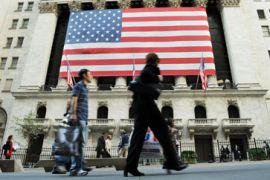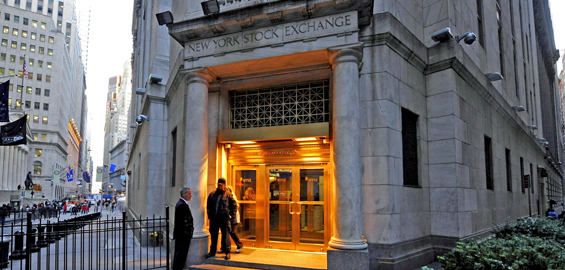Global cost of US stimulus plan
Could the world pay a price for Barack Obama’s plan to kickstart the US economy?

 |
|
The US has a $14 trillion economy, worth about a fifth of total global output [AFP] |
In his 1981 inaugural address, Ronald Reagan told Americans: “In this present crisis, government is not the solution to our problem. Government is the problem.”
But as Barack Obama, the current US president, sees things, government is in fact the only answer left to an economic meltdown that many say could be the worst since the Great Depression of the 1930s.
Keep reading
list of 4 items‘We need you’: Solomon Islands’ support for US agency’s return revealed
Why are nations racing to buy weapons?
Parallel economy: How Russia is defying the West’s boycott
Obama is pushing the US senate to approve the biggest expansion of government spending since World War II.
He wants $825bn to preserve and create jobs, to fix crumbling infrastructure, to generate new sources of renewable energy, and, above all, to restore Americans’ confidence so they will spend again, and get the economy going.
In his final months in office, Obama’s predecessor George Bush tried to use the Republicans’ favourite tool to fight the downturn: tax cuts. That failed.
Then, the Federal Reserve, the US central bank, effectively dropped interest rates to zero per cent, to get banks lending again, and to get businesses investing and making plans for the future. Another failure.
Global crisis
“At this point we really have no other option,” said Heather Boucher, an economist at the Centre for American Progress, a policy centre based in Washington DC.
“A big stimulus package is what we need now, and we need to be prepared for the fact that we may need to return to the trough if this doesn’t prove to be large enough.”
Many economists expect the final price to be higher. It already stands at over six per cent of US GDP, a huge amount of money, corresponding to the annual output in goods and services of the Netherlands.
However, the US is not your average country. It has a $14 trillion economy, worth about a fifth of total global output.
That critical mass, and the role of the dollar in world trade, has made it the traditional locomotive of world growth.
And it has made the crisis in the US a global one.
“Government has a role to play, stepping into the breach, generating demand, creating more jobs as best it can, as a bridge to a restarted private economy,” says Bill Galston, of the Brookings Institution.
“If consumers aren’t buying, and investors aren’t investing, there’s only one game in town, and that game is government.”
‘Buy American’
But if the US is seeking a solution in big government spending, its neighbours are finding problems in the stimulus plan.
The legislative package contains provisions calling for the use of American steel in infrastructure projects, for example, as well as other injunctions to “buy American.”
That doubtless makes the package easier to sell politically. But buying American also rides roughshod over the US’ international trade obligations.
| In depth | ||
|
|
Canada, the biggest trading partner of the US, is especially worried.
“We see this move to protectionism as something that’s dangerous and we’re warning our US neighbours to try and give this some good, sober second thought,” Stockwell Day, Canada’s international trade minister, told the Associated Press news agency.
Mexico, the other US partner in the North American Free Trade Agreement (Nafta), also has reservations.
That is because the stimulus may adversely affect other countries’ ability to finance a kickstart to their own economies.
When the US government turns to capital markets for its giant spending spree, it vacuums up money needed to fight the global downturn elsewhere.
“We, as developing countries, need to know that we won’t be crowded out of the capital markets, which is already happening,” Ernesto Zedillo, a former Mexican president, told the New York Times recently.
International implications
Throughout this crisis world leaders have warned each other against adopting a “beggar-thy-neighbour” approach, one involving policies to attract money away from nations nearby – the policy equivalent of setting off in the life raft without the other passengers of the sinking global ship.
But it’s hard to see what the US can do otherwise.
Boucher says “as the American consumer is cutting back, they are also cutting back on imports,” which, of course, means cutting back on the exports from the rest of the world.
“The best thing we can do is get our economy back on track … and then worry about the implications for our international friends and partners. And deal with those as the time comes.”
So Barack Obama faces a Herculean task.
Every solution seems to bring a new problem, needing another solution, as governments around the world look to the US to save itself, and, somehow, the world’s economy as well.

